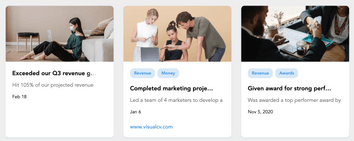
How to keep a work journal

A work journal is a great way to keep track of your career story.
Much like a personal diary, a work journal can help you set and achieve goals, track moods and stress, improve your writing skills, and more. Where a work journal differs with a personal diary is in its focus on your professional life.
When you keep a work journal, you keep track of the things that you find most important to your career. This might include important milestones, day-to-day tasks, professional development goals, or personal stress levels.
A work journal can help you understand your job, your work style, and your career objectives. When kept correctly, it can even help you score your next job.
With those benefits in mind, here’s how to keep a work journal.
Why keep a work journal?
Many people keep a work journal to record memories, organize thoughts, and reflect on the events of their work life, but a work journal can have practical goal-oriented applications as well. Keeping track of your day-to-day job activities is a great way to stay prepared for your next job application or performance review.
Easily update your resume
When you sit down to write a resume for the first time in years, it can be difficult to know what to write about. Summarizing an entire career history for a job application is no easy task, and many job-seekers start racking their memory for accomplishments only to draw a big blank.
When you keep a work journal, you will have a log of your career milestones, achievements, and professional development. You won’t need to memorize your accomplishments, or dig through old emails to figure out what projects you worked on at a previous job. You can simply refer to your work journal to see what you were up to.
It might seem crazy that you can spend five days a week at a job and be unable to remember how you spent your time, but this is common. The days roll together and it’s hard to think of what you actually did. With a work journal, this won’t be a problem.
Of course, not everything you write down in your work journal will be needed on your resume. To make the most of your journal, you might want to develop a system for keeping your most important milestones readily available. With VisualCV’s Career Journal, for example, you can Pin your most important milestones so they will be easy to find.

Prepare for performance reviews
When you keep track of your milestones and achievements in a work journal, you’ll always have an up-to-date record of your job performance. With this resource, you can always be ready for your next performance review.
It can be difficult to come up with examples of your most impressive accomplishments when you’re put on the spot. This is especially true when the boss is sitting across from you, judging your answers.
When you keep a work journal, you won’t have to scramble for examples of your performance. You can refer back to the journal right before the meeting and refresh your memory without having to wrack your brain for your most impressive accomplishments. Whether its projects you led, customer success scores, or sales numbers, you can find them all in your work journal.
When you consistently maintain a work journal, you won’t be caught off guard by a performance review.
Achieve professional goals
If you’re ambitious in your career, you should be consistently setting new goals and working to improve yourself. A work journal can help you set goals and track your progress.
Writing down your goals each day is a great way to help you stay focused. As you maintain your work journal, keep track of your goals, and think about how your tasks each day contributed to your larger career objectives.
This might refer to specific goals, like completing an ongoing project, or process goals, like practicing with a new coding language for an hour each day. A work journal is a great way to hold yourself accountable and ensure that you’re always making decisions with your goals and development in mind.
The way you keep track of your goals will depend on your journaling style. You may want to make a question about your goals one of your daily prompts, so you will always have them in mind. You can also set goals for the following day based on what you need to do.
Even if you’re unemployed, you can use your work journal to keep track of career goals like job searching or skill development. You might want to take note of what your strategy is for each application, set a goal for two applications per day, or keep track of which applications get a better response.
No matter what your goals are, a work journal is a great way to stay on-task.
Track your mood
Simply recording the events of a day doesn’t reveal much about how well you did, or how you felt about it. To make the most of your journaling practice, you can use your work journal to reflect on how you spend your time each day. This might include whether you are productive, whether you are consistently pursuing your goals, whether you are focused or distracted, and more.
While writing about your feelings might seem like something better suited for your personal diary, it can be worth taking note of how you feel in relation to your work as well. Keeping track of your stress or interest levels can help you understand yourself as a worker.
For example, you might not notice in the moment if you feel more stress when working alone, or on certain types of projects, but when you look back at your work journal the trend might be obvious. Maintaining a log of your mood as it relates to your work can help you understand what type of work makes you feel your best.
This could help you develop your work style, customize your workspace, or even consider a career change. Maybe you like working outside better than working in an office, for example–you just haven’t realized it.
Even keeping track of poor sleep and other external stressors can help you understand what factors affect your work habits. Tracking your mood in your work journal can help you structure life to improve your mental state and productivity.
Maintain gratitude
When you focus on productivity, goals, and stress levels, you might make yourself feel more unhappy than you really are. It can be helpful to note down some things you’re grateful for in your work journal as a means of keeping perspective.
Even if you encounter a setback, or don’t achieve your goals as quickly as you wanted, there may still be things in your work life worth appreciating. Jot down a few things you are grateful for to stay grounded. Some people keep a dedicated gratitude journal for this purpose, but a few points in your work journal should do the trick.
Take notes
Another great reason to keep a work journal is the simple, practical practice of notetaking. A work journal is a great place to keep a quick log of things you want to remember for later, whether it’s meeting notes, new tasks you have to do eventually, ideas you had, or subjects you want to research later. It’s never a bad idea to write something down, even if you don’t end up needing it.
Work journal guidelines
To make the most of your work journal, you should adopt a format that works for your career goals. The specific guidelines you use will depend on your objectives, your specific job, and your personality.
While you should tailor your work journal to suit your own preferences, here are some recommended work journal guidelines to help you make the most of your journaling practice:
Be consistent
Your work journal will only be useful if you make a habit of writing entries. Even if you’re having a slow period at work with no obvious milestones, it’s important to stay consistent. Keep track of your mood, schedule, or small tasks so that you don’t lose your journaling habit.
While there’s nothing wrong with pen and paper, keeping your physical journal on you every day can be difficult. To maintain a schedule, you may want to look for an online journaling tool that you can access from anywhere. VisualCV’s Career Journal, for example, will send you journal prompts right to your email, and you can add to your journal without leaving your inbox. If you make your work journal a part of your daily inbox sweep, you can be sure to never miss a milestone.

Your schedule doesn’t need to be daily, or even weekly, if that sounds like too big of a commitment. A monthly journal entry is still a great way to keep track of highlights and milestones from each interval. The important thing is that you don’t skip any entries.
Include all milestones
Any time you complete a project, you should note it in a journal entry. Even if it’s simple, like your first call with a client or leading a presentation for the first time, tracking milestones is an important part of tracking your personal development.

If your job is more process oriented, and doesn’t include taking on specific big projects, you can set your own goals for yourself. This might be improving efficiency, meeting certain metrics, using new tools or productivity methods, or even limiting time spent scrolling on your phone. You may even have career-focused activities outside of your day job that you want to take note of, like practicing a new skill.
You don’t need to be too discerning when you decide what to write about. Your work journal can be just for you. Anything that’s important to you, or comes to mind as you write, is good enough for the journal.
Use data
When you write your resume, using quantifiable achievements and hard data is a great way to write work experience that stands out. To make sure you’re ready to write your next resume, even if you aren’t actively applying, keep track of your measurable successes in your work journal.
Knowing that you have exceeded sales goals or consistently received good customer reviews will be more credible when you know exactly how those are measured.
For example, you may have “exceeded sales goals by $574” or “received 94% Great ratings” in your customer success survey. These specific measurements will be useful not only for your resume, but for performance reviews and your own personal development.

Track project progress
You aren’t going to hit an important career milestone every single day, but that doesn’t mean you didn’t do anything worth recording.
Even if the project isn’t done, you can keep track of what you did that day. Making sure you know what you do each day can help you understand how your work contributes to a larger project and what your time is really spent doing. While these smaller updates might not end up on your resume, they can be a great way of better understanding your own time and work habits.

Customize your work journal guidelines
You know yourself best. Set your own work journal guidelines with the prompts, goals, and intervals that work for you. You will see the best results when your work journal is tailored to your career and your work style.
Come up with the topics that are most important to you. Add the pictures or details that help you make the most of it. Many journalers like to embellish their notebooks, or include an inspirational quote in each entry. If you are journaling online, platforms like VisualCV allow you to upload thumbnails and documents to each entry, so it will still have your personality.
Make sure your work journal is a pleasure to use and you are more likely to keep using it.
Work journal templates
The details of your work journal will depend on your priorities. As you test out different formats to see what work journal format works for you, you might want to work from a template. Templates might use prompt questions, or simple categories:
Prompt question work journal template
- What did I work on today?
- Did it bring me closer to achieving my goals?
- Am I happy with my work?
- What can I work on tomorrow?
Work journal example
What did I work on today? Today I worked with the design team to test and review wireframes for our new product dashboard. Did it bring me closer to achieving my goals? Yes. This project is on-schedule and the meeting was productive. I am getting to know my coworkers and developing my leadership skills. Am I happy with my work? Yes. I feel that I led the meeting well and kept the team focused. What can I work on tomorrow? We encountered some topics that I had not considered. I believe that better pre-planning will help me predict meeting topics.
Prompt category work journal template
- Tasks
- Mood
- Goals
- Improvements
Prompt category work journal example
Tasks
- Reviewed new dashboard
- Met with design team
- Led product planning session
- Code review for Jr Dev
- App is on schedule
Improvements
- Better pre-planning could make meetings more efficient
Mood
- Stress is manageable
- Feeling confident about project schedule
Goals
- Set time aside for emails; don’t get distracted
- Keep project on schedule
Work journal example prompts
Many journalers like direct questions to prompt their work journal entries.
Examples include:
- What did I accomplish today?
- What was my stress level today?
- What did I do today that I would do differently in the future?
- What accomplishments am I proud of this month?
- What positive feedback did I receive this week?
- What is something I can work on tomorrow?
- What important decision did I make today?
- What am I thankful for today?
- Who did I work with today?
- What is preventing me from being more productive?
- What is preventing me from enjoying my work?
- How do I feel about the day’s work?
- What can I work on tomorrow?
- Did I get closer to my goal?
- What are my goals for tomorrow?
- What “wins” did I achieve today?
- What is a lesson I learned today?
- Did I go above and beyond my job description today? Did a coworker?
- What are highlights or milestones from this month?
- What failures did I experience this month?
- What skills have I developed?
- What skills should I work on?
If you prefer a more direct method, you can simply use headings. Work journal headings might include:
- Tasks
- Accomplishments
- Goals
- Mood
- Lessons
- Projects
- Progress
- Thoughts
- Frustrations
- Wins

Written By
Ben Temple
Community Success Manager & CV Writing Expert
Ben is a writer, customer success manager and CV writing expert with over 5 years of experience helping job-seekers create their best careers. He believes in the importance of a great resume summary and the power of coffee.

Keep track of your accomplishments with the new Career Journal.
April 1, 2021
Read Post

Community Success Manager & CV Writing Expert

Anyone can write a great resume by starting with the basics.
May 31, 2021
Read Post

Community Success Manager & CV Writing Expert

The top hiring and human resource statistics for 2025, including data on AI resumes, job interviews, remote work, and recruiting.
January 1, 2025
Read Post

Community Success Manager & CV Writing Expert
Copyright ©2025 Workstory Inc.